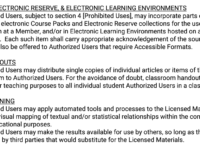Canadian copyright lobby groups have spent years falsely claiming that educational institutions refuse to pay for licences to compensate for the use of educational materials. This second post in my Fair Dealing Week series on Canadian copyright, fair dealing, and education focuses on this claim, which is a gross misrepresentation of the data (first post on Setting the Record Straight). The truth is that Canadian universities spend millions of dollars on licensing copyright materials. In fact, over the past decade, the emergence of site licenses that provide access to millions of works – books, journal articles, newspapers, and more – has led to huge increases in expenditures for access. Unlike copyright licences from copyright collectives such as Access Copyright, these digital licences provide both original access to works and the ability to use them in course materials. In the 1990s, a university would both purchase a book and pay for the right to copy a portion of it to distribute to students as course materials. Today, the university can use a single licence to gain access to the book and make it available as course material, handouts and for many other purposes since most digital licences facilitate access and permit multiple uses.
Post Tagged with: "Champagne"
Canadian Copyright, Fair Dealing and Education, Part One: Setting the Record Straight
Canadian copyright lobby groups have relentlessly lobbied the government to overturn decades of Supreme Court of Canada jurisprudence, seeking unprecedented restrictions on fair dealing that include eliminating it for educational institutions if a licence is available. In doing so, they have relied on a steady diet of misleading claims about the state of the law, the licensing practices of Canadian educational institutions, the importance (or lack thereof) of copying of materials in course packs, and the effects of fair dealing. This week is Fair Dealing Week, which provides an opportunity to set the record straight on Canadian copyright and education, backed by actual data on what takes place on university campuses across the country.
This blog series starts with an introduction to the issue and follows with upcoming posts on the growth of digital licensing within higher education, the gradual disappearance of course packs, the emergence of open access, the huge expenditures on transactional licensing that demonstrate a commitment to pay for materials where fair dealing does not apply, and the actual role of fair dealing (rather the false caricature painted by lobby groups). I covered many of these issues in a series five years ago, titled Misleading on Fair Dealing. This series will update the data, demonstrating that far from refusing to pay licensing fees, universities have continued to spend hundreds of millions of dollars on licensing access to materials. I am grateful to University of Ottawa law students Ephraim Barrera and Brianna Workman for their assistance on this project.
Actions Speak Louder than Words: Ministers Rodriguez and Champagne Post Mandate Letter to New CRTC Chair Vicky Eatrides
Canadian Heritage Minister Pablo Rodriguez and ISED Minister François-Philippe Champagne publicly released what amounts to a mandate letter to new CRTC Chair Vicky Eatrides this morning. The letter contains many laudable goals and aspirations: a more timely, transparent, and inclusive commission, an emphasis on competition in telecom, and an affirmation of the importance of freedom of expression in broadcast. Yet what matters when it comes to the current government and communications issues is not what it says, but what it does. The letter may represent a tacit acknowledgement of the disaster that was the Ian Scott era – the ministers themselves note the waning public trust in the CRTC – but the problems go beyond its chair.
Champagne’s Choice
The Rogers-Shaw merger saga was always destined to end on the desk of Innovation, Science and Industry Ministry François-Philippe Champagne. The merger has followed a familiar pattern: the companies started with a plan to merge without any divestitures that never stood a serious chance of approval, followed by adopting the Bell-MTS playbook of divesting assets to the weakest possible competitor in Xplorenet. When that didn’t fly, Videotron marched in to scoop up the wireless assets at a discount, complete with a story about exporting Quebec competition to other provinces and a politically attractive narrative for a Quebec-based minister who is reported to harbour future leadership ambitions.
The Law Bytes Podcast, Episode 144: Keldon Bester on the Rogers-Shaw Merger and the Problem with Canadian Competition Law
The proposed Rogers-Shaw merger was back in the news last week as Canadian Industry minister Francois Philippe Champagne held a mid-week press conference to announce that the original deal was dead, but that a reworked deal that brings in Videotron might be a possibility if certain government expectations on restrictions on transferring spectrum licences and consumer pricing outside of Quebec were met. Keldon Bester is a co-founder of the Canadian Anti-Monopoly Project (CAMP), a fellow at the Centre for International Governance Innovation and an independent consultant and researcher working on issues of competition and monopoly power in Canada. He’s been one of the most insightful and outspoken experts on the proposed Rogers-Shaw merger and he joins the Law Bytes podcast to discuss where things stand and the big picture weaknesses of Canadian competition law and policy.











